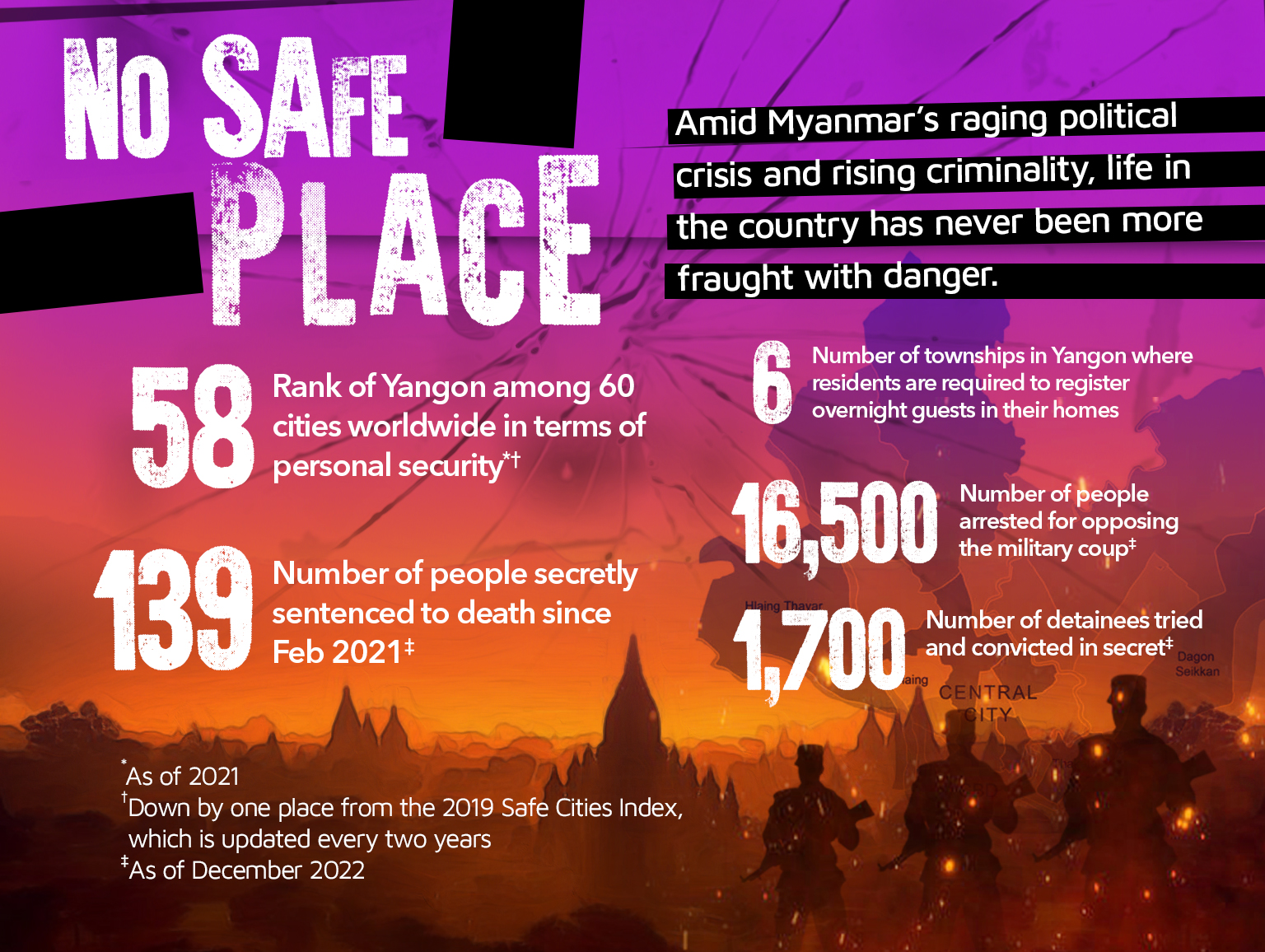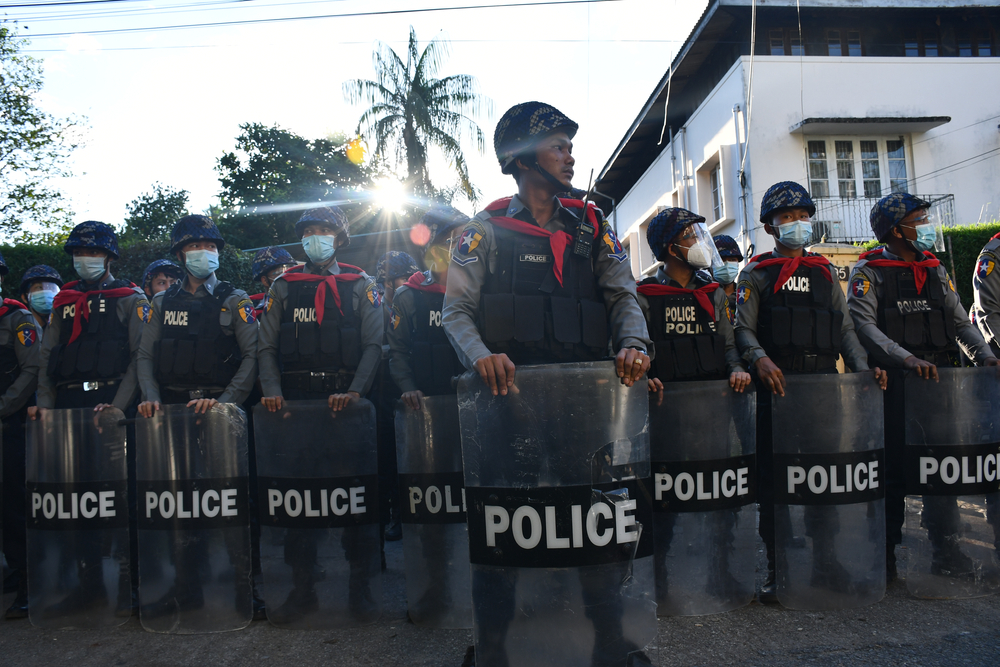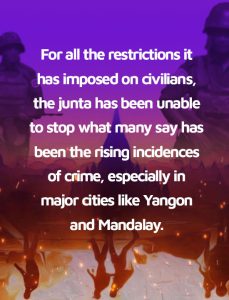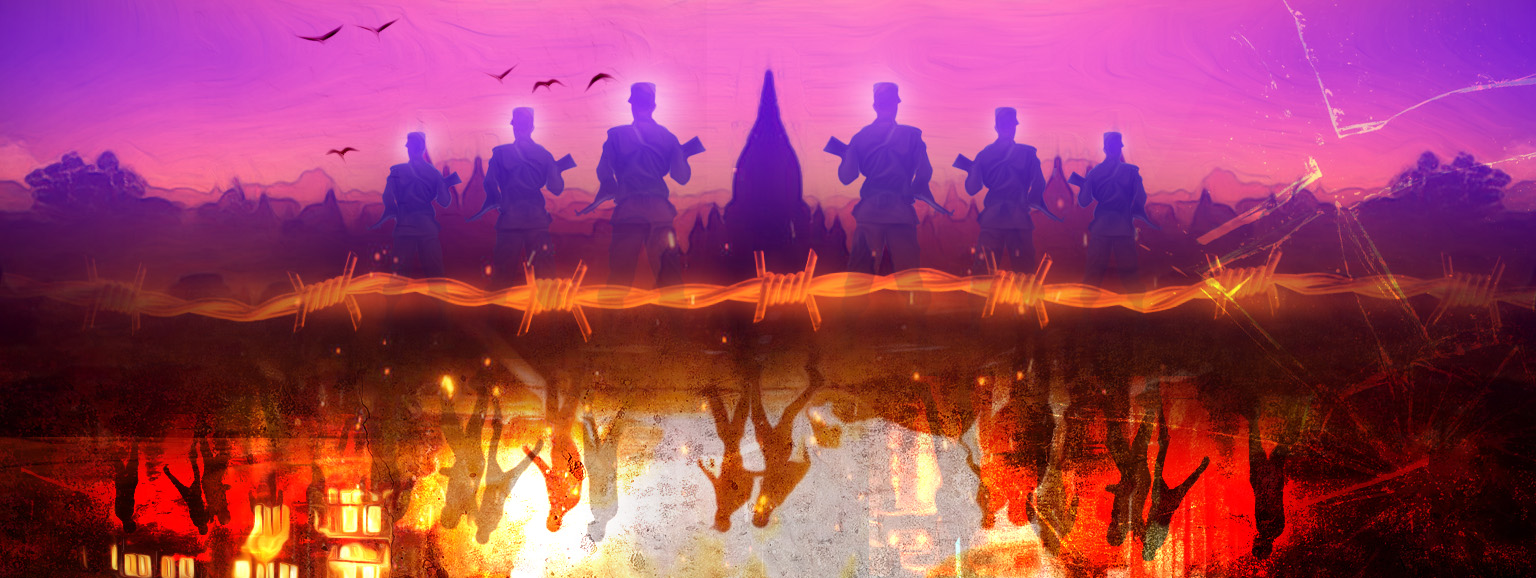|
Getting your Trinity Audio player ready...
|
T
here is no doubt that life has continued in Myanmar even after the military’s February 2021 power grab. In Yangon, Myanmar’s former capital, the golden stupa of the Shwedagon Pagoda still shines bright, rain or shine, day or night. In its shadow, the city’s residents go about their daily routine.
The military junta itself says that life in Myanmar is now back to normal and that it has everything under control. It even made a point of suspending the curfew in Yangon last New Year’s eve, just so everyone can enjoy the extravaganza it had prepared that night.
Yet there is palpable unease among the people of Yangon, and several can be seen casting wary glances here and there as they walk in the streets or talk to friends. A 23-year-old resident explains, “Unlike the situation before the military coup, we feel anxious when we see the police, though we have not done anything wrong. Moreover, there have been (a rash) of violent robberies, making us even more afraid for our lives.”

“We have no one to depend on for our protection,” the Yangon resident who works for a non-profit organization says. “When we go outside, we feel we are being monitored, and we cannot even freely talk about any topics, especially politics.”
Many say that they are unsure about going out especially at night, in part because authorities in Yangon have kept them in the dark about when the curfew hours are. They are said to change from time to time, but no one is sure. A taxi driver says, “As the military changes the night curfew orders and there have been rumors about the curfew all the time, I always try to go back home around nine p.m.”
“The security forces in Yangon are always drunk,” he also says. “They shoot if they want, and there is no rule of law.”
“Stable control”
In a briefing paper released last September 2022, the Special Advisory Council for Myanmar, an independent group of experts, classified Yangon as under “stable control.” But this by no means refers to the security of civilians, because the city is no longer safe for both visitors and locals. According to the Council, “stable control” did not even mean that the junta holds “effective sway over the population, but simply that their security forces and core infrastructure do not need to be actively defended.” This is even as the citizens seem to have largely been left to fend for themselves in the midst of worsening crime in the city of 5.5 million.

In truth, the military has managed to put Yangon under “stable control” by implementing a myriad of restrictions on residents that it backs up with sheer brutality. At least five townships in Yangon are even under direct military rule, which means martial-law orders apply there. Military tribunals have been established to judge cases of political opposition groups. So far, these military tribunals have sentenced more than 130 people to death.
Additionally, the junta has increased checks on household registration and overnight guest list inspection in Yangon, an activity aimed at tracking down its political opponents and members of the Civil Disobedience Movement.
Shortly after it took over power in 2021, the military reinstated a law requiring all households to register their overnight guests with their village or ward administrators directly supervised by the military regime. According to Yangon residents, however, it is neither easy nor convenient to go to the ward administration office for guest registration because of the presence of military forces. One young resident of Kamayut Township in north-central Yangon also recounts how a ward administrator asked him so many questions and then blatantly demanded money in exchange for getting a guest registered.
But the consequences of being found to have unregistered households or guests unregistered can be dire. A 26-year-old Yangon resident who shares a flat with five other young people of similar age says that they were all arrested for failing to update their household registration.
“They intentionally targeted our house as all the residents here are young,” says the Yangon local. “These inspectors include people with military uniforms, police uniforms, and registration office uniforms, and ward administrators. The soldiers were quite rude and tried to beat us without any reason. We were detained for one night and made to pay fines.”

One can also be subjected to inspection out in the streets, where there are several checkpoints. Moreover, authorities check phones at random, and zero in on photo galleries and social media applications such as Facebook. They check as well if the phones have VPNs, which are illegal by the military rule, and online games whose revenues supposedly support the opposition and in which the junta is the villain.
Increasing lawlessness
Young people are the primary targets of these inspections, whether in the streets or as part of households, because authorities believe they are a significant part of the driving force of the resistance. As there has been news of random arrests of youths whose phones were found with social media apps, many try to hide or delete these altogether before they venture out. Says one 23-year-old, “We will be in trouble if they check and find something suspicious.”
 Yet for all the restrictions it has imposed on civilians, the junta has been unable to stop what many say has been the rising incidences of crime, especially in major cities like Yangon and Mandalay.
Yet for all the restrictions it has imposed on civilians, the junta has been unable to stop what many say has been the rising incidences of crime, especially in major cities like Yangon and Mandalay.
Anecdotal data indicate that stabbing incidents and robberies have become rampant in Yangon. According to a Yangon public transportation information-sharing group, there were at least 13 cases of bus robberies during the last week of October 2022 alone. The next month saw two separate bus robberies in Yangon reported in just one day. Fight the Thieves, a group formed by young volunteers from Yangon to protect citizens and prevent crimes, says that between October and November last year, 76 people and 11 households in Yangon reported being robbed. Just this January, a Japanese national walking in a Yangon street was stabbed in the chest.
One 26-year-old student has been so traumatized at being robbed at knifepoint while on a Yangon bus that he has sworn “never to take” such public transport again.
“On the bus, a group of five men approached me and pointed at me with a knife,” he says. “Then, they got my wallet from my bag just like that. I could not even move my hands until they got off the bus.”
Some observers have attributed the rising lawlessness to the economic downturn that followed the 2021 coup. But others say that the junta has simply been concentrating on going after its perceived political opponents while letting the real criminals get away. Some Yangon residents even say that the military are “intentionally” allowing the crimes to happen. Says a visibly frustrated 23-year-old local: “In most crimes, the police cannot find the perpetrators. They do not care about the safety of residents in Yangon, and I even suspect that they might be collaborating with these criminals and letting these crimes happen.”
Indeed, cynics say that it has come to a point where if one weren’t stabbed or robbed in Yangon, one can be blown to bits. In May last year, for example, an explosion at a bus stop in downtown Yangon killed one individual and injured nine others. Five months later, two parcel bombs exploded inside the notorious Insein prison, leaving eight people dead, among them three prison personnel, and injuring some 10 more individuals. Last December, 17 people were injured by a bomb blast on a Yangon river ferry.
The military has repeatedly pointed at the People’s Defense Force (PDF) as the responsible party for such blasts, but has yet to offer any evidence to support its accusations. Interestingly, most of the explosions have not been claimed by any group or individual. The National Unity Government of Myanmar, which is the civilian government in exile, even flatly denied involvement in the May bus stop bombing, and accused the junta of being behind the incident.
Undeniably, though, popular resistance to military rule continues in the midst of all the mayhem. While many have taken up arms and joined the PDF, others have stayed in the cities and are channeling their energies into reminding people to keep up the fight. Last November, for instance, the Yangon Revolution Force organized a performance movement in Yangon in which young activists, their longyi and paso painted with anti-dictatorship slogans, suddenly appeared in many public areas across the metropolis.
While it is true that Yangon — and the rest of Myanmar — has become one of the most dangerous places to live, it is also true that many of its people remain determined to take back the freedoms they had lost.◉



















